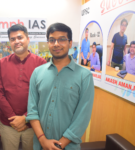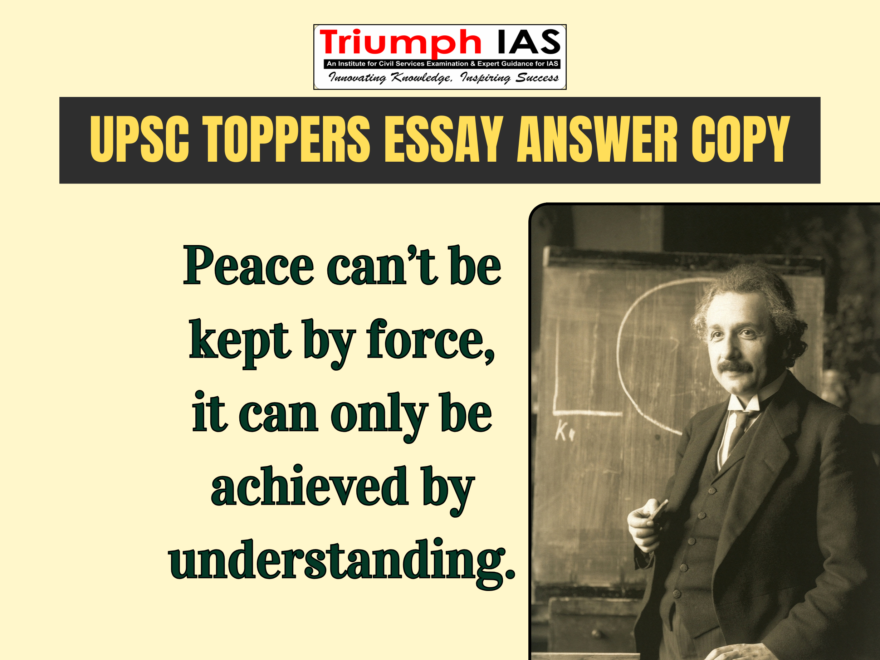IAS RAJAT YADAV took Mentorship under the
Personal Guidance of “Vikash Ranjan Sir”

Essay Topic:
Peace can’t be kept by force, it can only be achieved by understanding.
(Relevant for Essay Writing for UPSC Civil Services Examination)
The UPSC Mains Exam consists of total 9 papers, including an essay paper, which is crucial for determining the final result and ranking of candidates. Unlike Optional Subjects, the essay paper requires depth study, making it a significant factor in the selection process. The Essay Paper in the IAS Mains Exam comprises two sections, A and B, each containing four topics worth 125 marks, totaling 250 marks (125×2). Candidates are required to choose one topic from each section and write an essay of 1,000 to 2,000 words within the allocated three-hour time frame. When it comes to writing an essay for the UPSC exam, it should be well-structured, easy to understand, comprehensive, succinct, composite, definite, informative, and logical. To effectively prepare for the essay paper, practicing Essay Test Series and seeking Essay Mentorship are crucial. Many Toppers, including RAJAT YADAV, 141 Marks (Highest marks in Essay in CSE 2022), have followed 𝑽𝙞𝒌𝙖𝒔𝙝 𝙍𝒂𝙣𝒋𝙖𝒏 𝑺𝙞𝒓’𝒔 approach and wisdom for writing the essay.
|
“Peace can’t be kept by force, it can only be achieved by understanding.” Nicole Machiavelli and John Locke were having coffee at a café in Hong Kong. Machiavelli exclaimed at the protests going on outside, “we need policies of force and iron hands to quell these.” Locke, holding ‘Candide’ by Voltaire, read out a few lines from it. He told Machiavelli that humans have a capacity for reason and should be reasoned with if one wants lasting peace. In this essay, we’ll explore how peace is achieved through rightful means. We’ll walk through the lanes of history, society, government, economics, and others to find out whether peace can be achieved through force or understanding. Peace, as defined by Woodrow Wilson, is a state of non-antagonistic calmness, which allows humans and societies to flourish to their capabilities. Force is something inorganic, in the sense that it is hard, offensive, and acts against the ongoing flow of activities. Understanding, unlike force, is a slower process of taking things into consideration and reaching out to a long-lasting recalibration of thoughts, systems, and processes. History shows the futility of trying forceful means to instill peace in society. Dhanananda provides a case in point. Despite being super powerful, his rule with an iron hand led to resentment and eventual upsurge by Chandragupta Maurya. Samrat Ashoka also prophesied the need to follow Dhammaghosha (policy of peaceful advocacy of ideas) instead of Bherighosha (forceful expansionism and obedience culture). Akbar too found value in understanding the concerns of masses from different regions and cultures, the best example being Ibadat Khana for religious syncretism. Modern India saw innumerable instances of Britishers forcing the populace to be peaceful. Tribal rebellions like that of Santhals and Mundas were a direct result of these policies. Even in the post-nineteenth-century struggle, even the Britishers admitted that the policy of carrot (understanding and conciliation) proved to be more beneficial than the stick (forceful measures). Reforms like the Montagu-Chelmsford Reforms of 1919 saw more lasting acceptance vis-à-vis steps like the Arms Act and the Vernacular Press Act of Lytton. Society, which is massed with threats to peace like patriarchy, class struggles, and grave inequalities, provides a testbed for ‘how to achieve peace’. We’ve witnessed the rise of sedition cases under the Indian Penal Code along with societal tussles like divorce cases. As per Pratap Bhanu Mehta, these generate ‘more heat than light’. An approach of conciliation, understanding, and amicable persuasion has been evidently successful. “Understanding-based measures” have also borne fruits in the internal security problems of India. An example is the Bodo Peace Accord of 2020. This shows how rightful means can solve issues that have haunted ‘peace’ for so long. Measures like AFSPA Act are not seen as sustainable. “Proper assimilation” of reason is important to lead miscreants on a different path, as defense expert Manoj Joshi advises. Policies like Tribal Panchsheel are also worth mentioning in how comprehensive understanding is required to inculcate peace. In the realm of polity and governance, there are rich examples of how to achieve peace. Centre-state disputes, for example, have been solved to an appreciable extent when time is taken to appropriately understand the perspectives. Committees like Mihir Shah’s (for water federalism), Sarkaria, and Punchhi (for general federalism) have shown positive effects. The nation saw the largest farmer protest ever (as per The Economist magazine). The laws regarding farmers, which had the support of experts like Ashok Gulati, failed to generate acceptability. The reasons are a lack of discussion, deliberations, and understanding. It seemed that the policies were ‘forced’ upon the farmers of the nation. The aforementioned theses on ‘peace via force’ versus ‘peace via understanding’ are adequately resonated by our worldly understanding of peace. The concept originated as early as the fifth century BCE when Socrates talked about the concept of dialectics. According to Socratic dialectics, order and peace can occur when people understand the flaws in their values, ideas, and opinions, and at the same time understand the value in the views of others. For this to take fruition, force can never be the way. Because as per the “fight or flight” theories of biology, an antagonistic and aggressive attempt to change something, even if for the better, isn’t perceived so. Mighty China’s attempts to quell the ever-increasing protests in Hong Kong are surely unsustainable, as per Riya Mohan. The little legitimacy that it possesses is due to the ‘consent and understanding’ generating policies among the mainland Chinese populace. This shows that even Xi Jinping understands the value of peace via understanding and consensus. Globally, the ‘Articles of Peace’ talk about how international interventions are necessary for perpetuating rightful peace. But the erstwhile concept of the ‘Right to Protect’, under which the USA tried to ‘bring peace at the barrel of the gun’, is heavily despised now. Canada proposed ‘right while protecting’, in which proper understanding, mindfulness, and respect for relativities are given center stage in any regime changes and acts for peace. Coming back to India, we have more pressingly seen our most controversial policy aspects being rectified. The horrors of retrospective taxation, inspector Raj, and economic regulatory harassments are being mitigated. The Sabka Vishwas Legacy Resolution scheme and faceless tax assessment are steps in the right direction of inculcating economic peace and prosperity. In order to bring peace and contentment among the youth, the youngest demographic in the world (according to IMF), India is coming up with reskilling initiatives. ‘Samarth 4 days 4.0’ and ‘PM Kaushal Vikas Yojana’ provide a case in point. Even further, in order to bring order in schools, we’ve moved from forceful tactics like failing students to giving them avenues of reformation and retest. This essay’s juggling between various dimensions of times and space provides us with key ideas on how “peace can’t be kept by force, but can only be achieved via understanding”. Global pioneers of peace and our own national forefathers have left a plethora of ideas to guide us in this direction. Rousseau’s general will, Aristotle’s value of ‘deliberative democracy’, and Gandhi’s conception of ‘peaceful satyagraha’ are among such ideas. All these are “different leaves of the same tree”, the tree of peace and understanding. In theory, as per the above geniuses, force and peace are antithetical concepts. So they can’t be used to achieve either of them. Peace, if achieved by forceful means, can’t be sustained beyond a short time. Understanding of the various cross-currents, ideas, theories, situations, reasons, and systems is necessary to arrive at a ‘win-win’ situation. Post-modern scholars like Daniel Bell even claim that there are no absolute truths but “multiple truths”. Unless we understand such truths, it is difficult to arrive at peaceful solutions. Back at the Hong Kong café, Machiavelli realizes the flaws in his theories of achieving peace. While being proud and adamant about his theories of statecraft, he gives in to the fact that ‘peace can’t be kept via force but only by understanding’. Machiavelli and Locke have a laugh. Machiavelli, at last, reads out a fascinating quote by Henry Ford written on his table: “Coming together is the beginning, keeping together is progress, and working together is success”. |
Why Vikash Ranjan’s foundation Classes for Essay?
Proper guidance and assistance are required to learn the skill of writing essay topics in CSE examination. VIKASH RANJAN SIR at TRIUMPH IAS guides students according to the Recent Trends of UPSC, making him the Best Essay Teacher for Essay writing UPSC.
At Triumph IAS, the Best Essay Writing Coaching platform, we not only provide the best study material and applied classes of Essay for IAS but also conduct regular assignments and class tests to assess candidates’ writing skills and understanding of the subject.
Choose The Best Essay Writing Teacher for IAS Preparation and Know our Approach for Essay?
- The Programme is Planned & Executed in a Way that You Write a good Essay for obtaining Effective Score of 140 Plus.
- In this programme we provide Classes on
- How to INTRODUCE The Topic in Context of the THEME of the Essay
- How to Elaborate & Explain the Topic-Theme on Temporal Scale & Sectoral Scale as well as Intellectual Scale in the MAIN BODY of the Essay.
- How to Sum up the Topic in CONCLUSION in Context of the Essay Topic Theme.
- ︎We will Teach You How to use the Knowledge Matrix of General Studies & Optional to write a Good Essay more Logically and Coherently.
- After the Classes You have to “Write to Learn & Learn to Score” .This means You have to Write the Essay Test Papers & Learn from the Feedback & Discussions.
Why Essay is Important and What We Offer in “Essay Test Series”?
- Triumph’s Essay Upgradation Test Series (Under Personal Guidance of Vikash Ranjan Sir) doesn’t only focus on improving student’s linguistic skills but also focus on improving student’s ability to comprehend the topic-sentence (subject) recall & relate the facts, concepts, propose thesis-statements, and logically assimilate the ideas & counter ideas with clarity in expression on temporal & Sectoral Scales of knowledge.
- Further students are provided one-on-one INTERACTION* Session with Vikash Ranjan Sir. Students get personal feedback on their strength and weaknesses, regarding what is ‘good about their essay and what more should be done to make it a better one’ by Vikash Ranjan Sir.
Why to take up this “Essay Test Series and Foundation” Course?
- Essay is Low hanging Fruit. Marks in Essay is Effectively Contributing in Final Selection in New Pattern of Mains Exam. With a Well Developed ‘Knowledge Matrix and Rigorous Practice’, One can Score up to 160 + in Essay. So IAS Aspirants should never Ignore Essay Preparation
- Inculcating Writing Competency in Essay for IAS, which is Different from Essay in English, Essay in School and College.
Follow us :
🔎 https://www.instagram.com/triumphias
🔎https://www.youtube.com/c/TriumphIAS
🔎https://t.me/VikashRanjanSociology


One comment